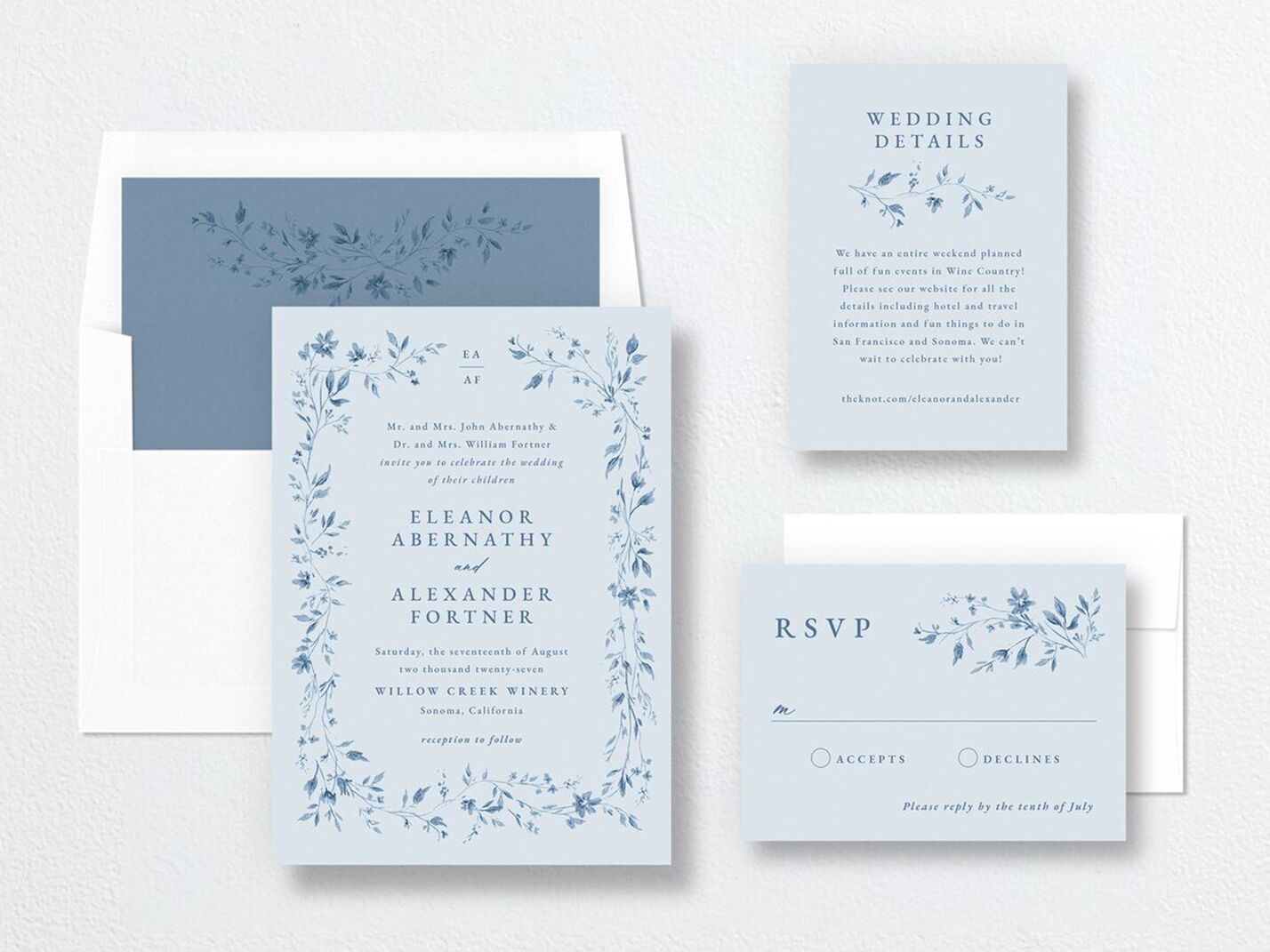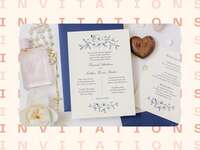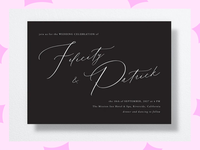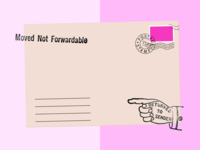When Should RSVPs Be Due for a Wedding? A Helpful Timeline

Finalizing your guest list and sending wedding invitations are two big steps, but the work doesn't end there. Next up: waiting for your guests to RSVP. But when should RSVPs be due for your wedding? It can feel agonizing to not be able to lock in your guest count or begin a seating chart until you officially receive confirmation from each and every one of your guests, but it's important to set an RSVP deadline and stick to it. Below, find out exactly when wedding RSVPs should be due and how to move forward if you still haven't gotten a definitive "yay" or "nay" from people by the deadline.
In this article:
- When Should Wedding RSVPs Be Due?
- When Should Guests RSVP for a Wedding?
- When to Follow-Up Before RSVP Deadline
- Wedding RSVP Timeline
- Why It's Important to Set the Right RSVP Date
When Should Wedding RSVPs Be Due?
Your wedding RSVPs should be due at least four weeks before the wedding, and absolutely no later than two weeks before the wedding day. The sweet spot for your RSVP due date is around three to four weeks before the wedding—this gives you enough time to organize your final guest list and figure out who (if anyone) hasn't responded yet. Add the date to your own wedding planning checklist, along with your wedding website and wedding invitations so guests are fully aware.
Assuming that you send your wedding invitations between six and 10 weeks before the wedding, this gives your guests enough time to officially make up their minds and arrange travel accommodations if necessary. If you leave too much time between when the invitations are sent and the RSVP date, you run the risk of your guests putting it off and forgetting.
When Should Guests RSVP for a Wedding?
As a guest, you should RSVP for a wedding as soon as you officially know you can or cannot attend. It's fine to RSVP before the deadline listed on the invitation—in fact, the sooner you accept or decline the invite, the better. The couple will thank you for your promptness because they won't have to follow up to confirm your attendance, and you'll make their lives easier by helping them get an idea of the final guest count as soon as possible. Our tip: If you have a physical RSVP card that needs to be sent back to the couple, be sure to drop it in the mail about a week before it's actually due.
So what's the absolute latest when guests should RSVP by for a wedding? About two weeks before the event. By that time, the couple need to share a final guest count with their wedding caterer, venue and other vendors. Waiting too long to RSVP will cause more work for the couple because they'll have to personally follow up, and if they can't track down your response, they may eventually assume you're not coming to the wedding. (This is your not-so-subtle etiquette advice: Don't show up on the wedding day without submitting your RSVP.)
When to Follow-Up Before RSVP Deadline
If your wedding RSVP deadline has passed, wait about one week before sending follow-ups to guests who haven't responded yet. Some people simply forget and accidentally miss the RSVP deadline, so a friendly phone call or text will politely nudge them. To get ahead of the game, you can send guests a quick wedding RSVP reminder the week before they're actually due or add a note to your wedding website. Plan to follow up with all guests who haven't RSVP'd at least two weeks before the wedding. If anyone's RSVP is incomplete or missing information, like their meal selection, now's the time to follow up about those details, too.
Wedding RSVP Timeline
RSVPs seem pretty self-explanatory, but it's important to get the timing right so you can make sure all of your last-minute wedding details are in order. Use this sample timeline to help you stay on track.



Six to Eight Weeks Before the Wedding
Your guests have already received their save-the-dates, but now is the time to send the official wedding invitations. If you're having a destination wedding, send the invites a little further in advance—closer to 10 or 12 weeks before the wedding—to give people more time to make accommodations.
Five Weeks Before the Wedding
Hopefully, most of your RSVPs have started rolling in by now. But if it seems like a lot of guest responses are still outstanding, you can send a friendly reminder to RSVP about one week ahead of the deadline.
Four Weeks Before the Wedding
Set your wedding RSVP deadline about four weeks before the wedding day. Be sure to clearly include the deadline on your invitations and wedding website so the date isn't overlooked by guests. Since not everyone uses snail mail anymore, maximize your chances of getting RSVPs on time by giving people a few different ways to respond. Along with a paper RSVP card tucked into the invitation suite, you can use The Knot Guest List Manager to collect online RSVPs through your wedding website. Plus, it helps you keep track of other important details, like wedding gifts, reception meal choices and song requests.
Three Weeks Before the Wedding
If you still haven't heard from several people past the RSVP date (and yes, give them until that date), the best option is to pick up the phone and give them a call. Start following up with guests who haven't RSVP'd about a week after the deadline has passed. While it might feel awkward at first, it's important to get an idea of your final guest count as soon as possible—and the closer you get to the wedding, the busier you'll be with other last-minute to-dos.
Remember to express enthusiasm for their attendance throughout the process. That way, they'll know their presence means a lot to you, making them more likely to check "yes." Once you have verbal confirmation, you can ask them to RSVP for the wedding online too so your records are organized.
Two Weeks Before the Wedding
Around the two-week mark, connect with your wedding caterer, planner, venue coordinator and any other vendors who are waiting for your final guest count. This is when you'll finalize the number of table settings, entrees, wedding favors, escort cards, and any other items that are being given to guests. Separately, once the RSVPs are all in, it's time to start working on the seating chart and decide who's sitting where. If you're working with a professional stationer or calligrapher to design the seating chart, they might request the final list of names a little earlier.
One Week Before the Wedding
Hopefully you don't have to follow up with too many guests at this point, but if you do, kindly make it clear that you'll need their response in order to have them at the wedding. While it's not okay to uninvite a guest, letting them know that you're finalizing seating arrangements and entree selections should give them the hint that their RSVP is down to the wire.
Why It's Important to Set the Right RSVP Date
Setting the right RSVP date for the wedding is important because it helps your to-do list move along in the final weeks of planning. In the months leading up to the wedding, you can check off the boxes for major details, like music, decor and attire. But there are a few details you can't finalize until you know exactly how many people are attending, including the number of rentals (like tables and chairs), how much alcohol you'll need and the final names for your seating chart.




















